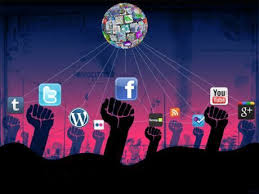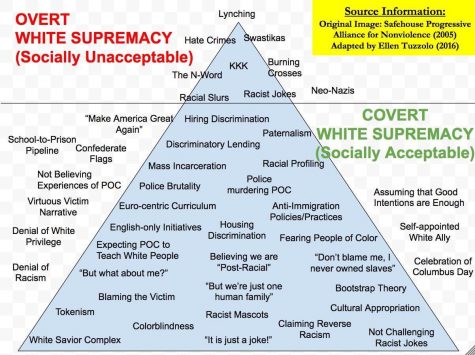Educate Yourself: The Role of Social Media in 2020

Social media has always been a platform for people to publicly voice their opinions, and has, in fact, been used as a way to inform people of injustices but, now more than I have ever seen before, people have taken to media sites to highlight the injustice of the murder of George Floyd. Photo Credit: The Get Smart Blog
May 31, 2020
I, like many, have rushed to social media during this pandemic as a form of social interaction that can be conducted from my bed. At the beginning of quarantine, my Instagram homepage was littered with challenge posts, and every story I clicked on said the same thing: “thank you to @___ for nominating me, I nominate @___.” If you liked a picture with the caption “Until tomorrow,” you had to post an embarrassing picture of yourself with the same caption and leave it up for twenty four hours. Later, there were tik toks to watch, endless scrolling filling the void of time. Now, social media is taking on another form: social justice.
Social media like Instagram, Twitter, Facebook, and many others, has always been a platform for people to publicly voice their opinions, and has, in fact, been used as a way to inform people of injustices and call out those responsible or those who can fix the issue. But, now more than I have ever seen before, people have taken to media sites to highlight the injustice of the murder of George Floyd. Almost everyone I know, myself included, has posted something about the incident. #JusticeForFloyd, #BlackLivesMatter, #RaiseTheDegree. Every time an incident of this sort, the killing of an innocent black person, occurs, I see posts on Instagram. Yet, every time, there is a next time, and a next time, and a next time. As a white person, I know I have a privilege. I know that if I am ever in a situation where I have to call the police, or if I get pulled over, I do not have to worry for my life. I don’t have to worry that I might have to face racism in any form. I don’t have to worry that I might not get hired because of my race. I don’t have to worry that I won’t be able to find a place to live because of my race. So many others in America do not get to feel this way. So many others experience every day something that I have the privilege to not even think about. This is something social media has opened my eyes to. When I first heard about the murder of George Floyd, I was hesitant to post anything. I thought that it was unnecessary. I thought that the voice of more white people wasn’t needed. I thought that because I had signed a petition, I was doing something, and that that was good enough. I was wrong. Recently, I read a quote by Robin DiAngelo, the author of a book called White Fragility: Why It’s So Hard for White People To Talk About Racism.
“In speaking as a white person to a primarily white audience, I am yet again centering white people and the white voice. I have not found a way around this dilemma, for as an insider I can speak to the white experience in ways that may be harder to deny. So, though I am centering the white voice, I am using my insider status to challenge racism. To not use my position this way is to uphold racism, and that is unacceptable; it is a “both/and” that I must live with. I would never suggest that mine is the only voice that should be heard, only that it is one of the many voices needed to solve the overall puzzle.”
This helped open my eyes to the fact that while I cannot and will never be able to speak to the experiences of people of color, I have a position in which I need to speak up. I have a duty as a white woman to share with other white people who may have not considered how their whiteness has given them a privilege in life. I have a duty to share with other white people who have yet to consider what systemic racism is and how it has led to great inequalities in our country. As a white woman who lives in a predominantly white neighborhood, and goes to a predominately white school, I do not often see or hear of the experiences of people of color. Because of this, I often receive most of my knowledge of everyday racism from social media, often through the Instagram pages with story after story of innocent black people being killed by the police. It is not enough to stay knowledgeable on the subject, I must actively educate others and fight the systems of oppression that affect people of color all over the country. As Martin Luther King Jr. said, “The ultimate measure of a person is not where one stands in a moment of comfort and convenience, but where one stands in times of challenge and controversy.”
Social media is a great way to bring attention to these issues, but there are many other ways to help.
Educate yourself:

Sign the petition here
Text FLOYD to 55156
Text JUSTICE to 668366
Donate to the George Floyd Memorial Fund
Donate to the Minnesota Freedom Fund
Donate to Black Lives Matter
Sources:
DiAngelo, Robin J. White Fragility: Why It’s so Hard for White People to Talk About Racism. Beacon Press, 2018.


